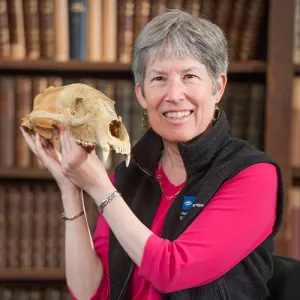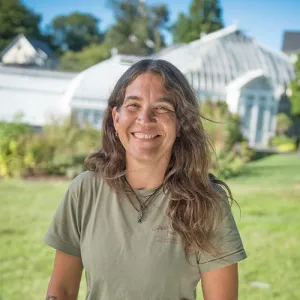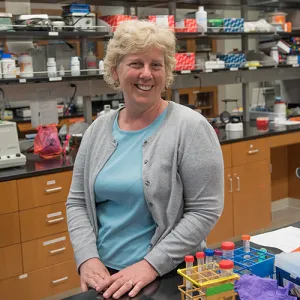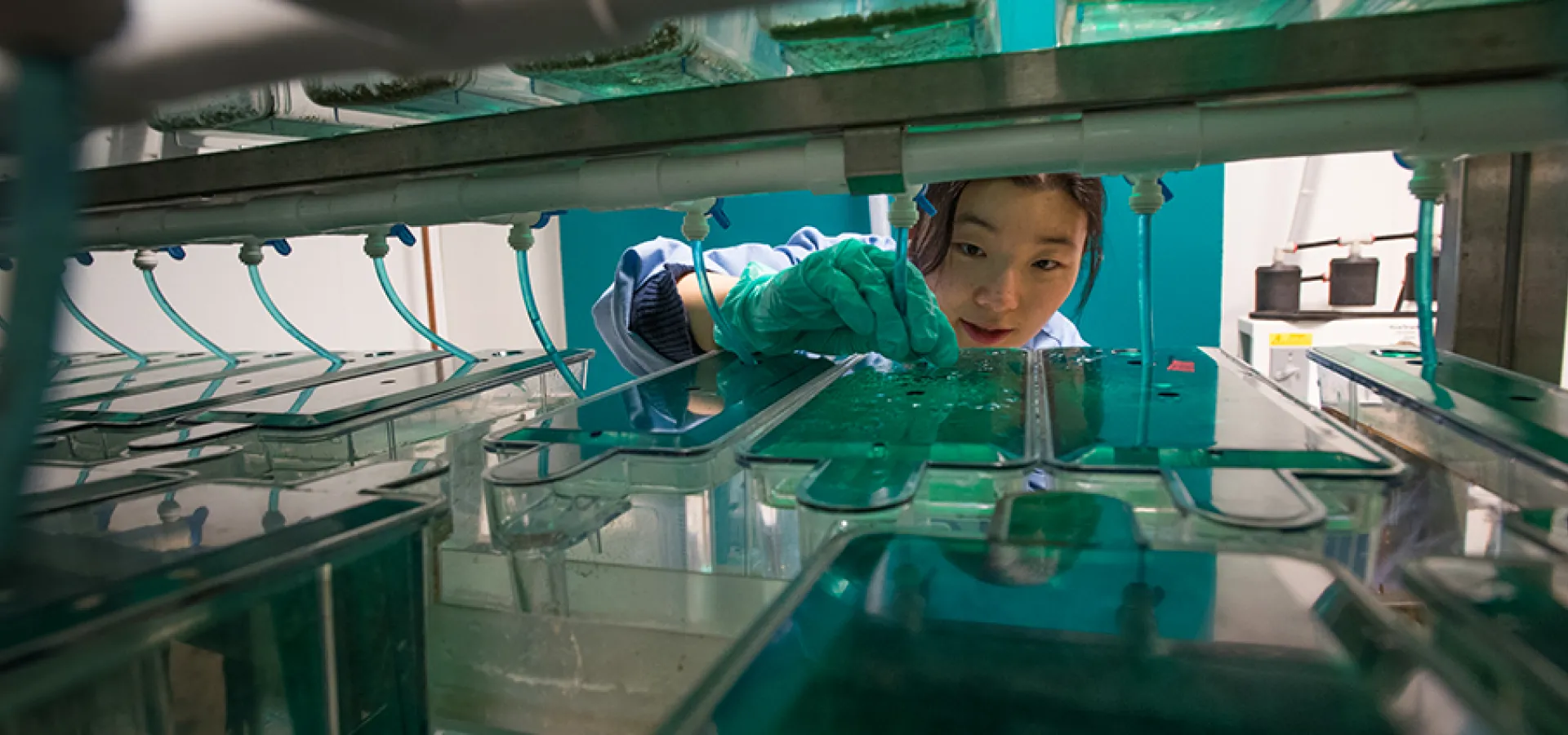
Biological Sciences
The Department of Biological Sciences treats the life sciences in all their breadth and diversity, including the study of molecules, cells, whole organisms, ecosystems, plants, animals and microorganisms. The requirements for the major in the biological sciences provide both a solid foundation in biology and opportunities to pursue special interests.
The major embraces three broad core areas: cells, physiology and development; genetics, molecular biology and evolution; and biodiversity, ecology and conservation. All majors are strongly encouraged to pursue collaborative research with any of the department’s faculty members who work in areas as diverse as bacterial pathogenesis, ecological impacts of invasive marine organisms, ecology of coral reefs, regulation of photosynthesis, ciliate evolution, muscle biochemistry, mammalian reproductive ecology and the molecular biology of human parasites.
Requirements & Courses
Goals for Majors in Biological Sciences
The biological sciences form the foundation of a number of academic disciplines at Smith, including biology, biochemistry, neuroscience, landscape studies and environmental science and policy. The major in biological sciences itself spans organisms from bacteria through plants and animals, levels of organization from molecules and cells through ecosystems, and modern research methods in both the laboratory and the field.
Students in biological sciences master fundamental concepts in introductory courses with associated laboratories or fieldwork. In those courses, students conduct research projects, an emphasis on research that recurs in the upper-level courses that follow. As they choose those courses, they select a track to focus their learning in specific areas (cells, physiology and development; genetics, evolution and molecular biosciences; biodiversity, ecology and conservation) or instead choose a broad integrative approach that can include an option to prepare to teach at the secondary-school level.
Learning Objectives for the Biological Sciences
CONTENT-RELATED
- Broad knowledge of the field of biology and its foundational concepts
- Deeper knowledge, fluency and ability to creatively engage in a subdiscipline of biology
- Use of interdisciplinary fields to support an enhanced understanding of the life sciences
SKILLS-RELATED
- Critical thinking and rigorous evaluation of primary scientific research
- Evaluation and understanding of one’s own learning process
- Demonstrated ability using the scientific method, empirical approaches and the generation of original knowledge
- Competency in employing standard quantitative and statistical approaches to organize, analyze and interpret scientific data
- Effective communication of scientific information to academic and general audiences
ETHICAL CONDUCT AND CIVIC ENGAGEMENT
- An understanding of science and research ethical considerations
- Building identity and confidence within the field of the life sciences
- Understanding and participation in public and stakeholder concerns related to science policy with evidence based approaches
With a rich array of courses and access to extensive research resources, students in biological sciences graduate with the knowledge and experience they need to begin careers in research, academia, the health professions, the biotech and pharmaceutical industries, conservation, wildlife management, secondary education and many other endeavors.
Goals for Master of Science in Biological Sciences
The master’s program in biological sciences continues and enhances the undergraduate foundation of a number of academic disciplines, including biology, biochemistry, neuroscience, and environmental science and policy. This program focuses on modern methods in both laboratory and field research and requires students to design and implement a thesis demonstrating sophisticated experimental and conceptual approaches to substantive questions in the biological sciences.
Over the course of the program, students are expected to develop:
- A deep knowledge of a life sciences subdiscipline through a faculty-mentored research project.
- The ability to think critically and design rigorous experiments.
- The ability to collect, organize and analyze data.
- Laboratory and/or field research skills using sophisticated instrumentation.
- Read, synthesize and critique primary research articles in their field.
- Enhanced skills in writing and public speaking through presentations in classes, campus research symposia and at regional or national scientific meetings.
With a rich array of courses and access to extensive research resources, graduate students in biological sciences reinforce and expand their knowledge and the experience they need to continue successful careers in the life sciences.
Biological Sciences Major
Track 1: Integrative Biology
Track 2: Cells, Physiology and Development
Track 3: Genetics, Evolution and Molecular Biosciences
Track 4: Biodiversity, Ecology and Conservation
Track 5: Biology and Education
Requirements for tracks 1-4
Twelve courses in addition to associated laboratories
- Three core courses
- BIO 130
- BIO 132
- BIO 230 or BIO 232.
- CHM 111 or CHM 118
- One course in statistics: SDS 201 or SDS 220 (recommended)
- Five upper-level BIO courses as suggested for each track (see track descriptions below)
- Two 300-level courses
- Three 200- or 300-level courses
- Two electives chosen in consultation with the major adviser, one of which may be a 100-level BIO course not considered a core course (BIO 130/BIO 131, BIO 132/BIO 133)
- Five laboratory courses (Laboratories do not fulfill the upper-level or elective course requirements. One-credit and two-credit laboratories are not counted as separate courses toward the minimum 12 required courses.)
- BIO 131
- BIO 133
- One 300-level laboratory course
- Two laboratory courses at the 200 or 300 level
Track 1: Integrative Biology
Students must complete a minimum of five 200- or 300-level courses as well as three laboratories from tracks 2-4. At least one course from each of Tracks 2, 3 and 4 must be included in the program of study. Courses listed in more than one track can only be counted once.
Track 2: Cells, Physiology and Development
Students must complete a minimum of five 200- or 300-level courses and three laboratories from the following list:
Courses: BIO 200, BIO 202, BIO 204, BIO 206, BIO 230, BIO 232, BCH 252, BIO 300, BIO 302, BIO 306, BIO 308, BIO 310, a topic of BIO 321, a topic of BIO 322, a topic of BIO 323, a topic of BCH 390, NSC 318 and BIO 368.
Labs: BIO 201, BIO 203, BIO 205, BIO 207, BIO 231, BIO 303, BIO 307 and BIO 369
Track 3: Genetics, Evolution and Molecular Biosciences
Students must complete a minimum of five 200- or 300-level courses and three laboratories from the following list:
Courses: BIO 230, BIO 232, BIO 264, BCH 252, GEO 231, BIO 302, BIO 306, BIO 310, a topic of BIO 321, BIO 332, BIO 334, BIO 336, a topic of BIO 340, a topic of BIO 350, a topic of BIO 351, BIO 366, BIO 370 or a topic of BCH 390.
Labs: BIO 231, BIO 265, BIO 303, BIO 307, BIO 333, BIO 335, BIO 337, BIO 371.
Track 4: Biodiversity, Ecology and Conservation
Students must complete a minimum of five 200- or 300-level courses and three laboratories from the following list:
Courses: BIO 200, BIO 206, BIO 232, BIO 260, BIO 264, BIO 266, BIO 268, BIO 272, GEO 231, BIO 302, BIO 364, BIO 366, BIO 370, a topic of BIO 390 orEGR 315.
Labs: BIO 201, BIO 207, BIO 261, BIO 265, BIO 267, BIO 269, BIO 273, BIO 303, BIO 363, BIO 365, BIO 369, BIO 371 and BIO 373.
Requirements for track 5
Twelve courses
- Three core courses
- BIO 130 and BIO 132
- BIO 230 or BIO 232
- CHM 111 or CHM 118
- One statistics course: SDS 201 or SDS 220 (recommended)
- Three courses
- One course each from tracks 2, 3 and 4
- At least one 300-level course
- Four laboratories (One-credit and two-credit laboratories are not counted as separate courses toward the minimum 12 required courses.)
- BIO 131 and BIO 133
- One 300-level laboratory
- One laboratory course
- Four education-related courses: EDC 238, EDC 235 or EDC 342, EDC 347 and EDC 390
To satisfy the requirements of MA state licensure in the teaching of biology (5th–8th grades or 8th–12th grades), the following additional courses should be taken as “outside major course credit”: EDC 311, EDC 346, EDC 352, EDC 352L.
Track 5: Biology and Education
Graduates receive a degree in biological sciences and may be able to complete the requirements for a Massachusetts teaching license for high school and middle school biology. While this track, like the others, still requires 12 courses to complete a biology major, additional courses outside the major should be carefully selected in order to prepare you for completion of a MA state teaching licensure. This track is designed for the student who plans to become a secondary education teacher in biology. Students interested in this track should contact the coordinator of teacher education as soon as possible.
Consult closely with your adviser in biology to plan the inclusion of these license-required courses, as well as with your education adviser to stay abreast of any state regulatory changes that may impact the required curriculum.
Major Requirement Details
- Independent research is strongly encouraged but is not required for the major.
- With the approval of the major adviser, one semester of Special Studies BIO 400 or Honors BIO 430D or BIO 432D, taken for 3 or more credits, can substitute for an elective or for a 200- or 300-level laboratory.
- With the approval of the student’s adviser, one course in the major taken at any time, and one additional course taken in the 2020-2021 academic year, may be graded S/U. All relevant courses taken in Spring 2020 and graded S/U are also counted toward the major.
- Students receiving advanced placement on their Smith College transcript for biology (e.g., AP, International Baccalaureate, A Levels) may, in consultation with their adviser, substitute either BIO 130 or BIO 132 with a 200- or 300-level course in the same subfield of biology as the course they are bypassing (e.g., a course in cell biology, physiology and development in lieu of BIO 132, or a course in biodiversity, ecology or conservation in lieu of BIO 130). Advanced placement credits cannot be used to bypass the introductory series lab courses, BIO 131 and BIO 133.
Preparation for Graduate Study in the Biological Sciences
Graduate programs granting advanced degrees (M.S, MPH or Ph.D) in the Life Sciences vary widely in their admission requirements. These often include at least one year of mathematics (including statistics), physics, and organic chemistry. Many programs stress both broad preparation across the biological sciences and deeper training in a specific subfield within the Life Sciences. Students contemplating graduate study beyond Smith should review the requirements of particular graduate programs well in advance of applying, and should seek advice from members of the department.
Honors
Please consult the director of honors or the departmental website for specific requirements and application procedures.
Biological Sciences Minor
Requirements
Six courses
- One core course: BIO 130, BIO 132, BIO 230 or BIO 232
- One 300-level course
- Four 200- or 300-level courses
- One laboratory course (one-credit or two-credit laboratories do not count as separate courses toward six-course requirement)
- No more than one course designed primarily for non-majors may be included.
- One course from another department or program may be included, provided that course is directly relevant to a student’s particular interest within biology and is chosen in consultation with the minor adviser.
Courses
In their first two semesters, students are encouraged to enroll in an appropriate core course (BIO 130/BIO 131 or BIO 132/BIO 133) as well as in an introductory chemistry offering (CHM 111 or CHM 118).
BIO 100 Human Origins: Disentangling the Myths and Facts that Surround the Evolution of Our Species (4 Credits)
This course focuses on the origin and diversification of our species (Homo sapiens), with a focus on African origins and genetic diversity among extant populations. Using principles from evolution, topics covered include: 1) the relationship of humans to other primates; 2) the timing and location of the origin of modern humans; 3) the geographic history of humans, and the structure of contemporary human diversity; and 4) implications of human genetics/genomics for healthcare/medicine. {N}
Fall, Spring, Alternate Years
BIO 120 Horticulture: Plants in the Landscape (3 Credits)
Course focuses on the intersection of plants and people. Topics include introduction to landscape plants and their usage, plants as food, plants as urban green infrastructure, garden design history and current issues such as the colonial history of botanic gardens, invasive species and community gardening. Course includes lectures, guest lecturers and in-class discussions. Corequisite: BIO 121. Enrollment limited to 45. {N}
Fall
BIO 121 Horticulture: Plants in the Landscape Laboratory (1 Credit)
Identification, morphology, and use of landscape plants including annuals, perennials, trees and shrubs, groundcovers, and tropicals. Introduction to horticultural practices including pruning, division, pollination, bulb planting, plant identification and landscape design. Use of the Botanic Garden outdoor collection as well as field trips are important components of the course. Course requirements include landscape design assignments and creation of a Field Guide to plant materials covered in the course. Enrollment limited to 15 per section. {N}
Fall
BIO 122 Horticulture: Botany for Gardeners (3 Credits)
Survey course in the fundamentals of horticulture and basic botany. Plant structure and function, nomenclature, nutrition, seed biology, propagation, pests and diseases, soils, compost, and an introduction to biotechnology. Discussions include growing fruits, vegetables and herbs. Course requirements include a field notebook, in-class discussions, independent engagement with written and multimedia resources, and a book review. Corequisite: BIO 123. Enrollment limited to 45. {N}
Spring
BIO 123 Horticulture: Botany for Gardeners Laboratory (1 Credit)
Practical lab experiences in plant propagation, morphology, development and physiology, soils, seeds, floral design, and an herbal apothecary. Use of the Lyman Conservatory, field trips, and winter and spring observation of outdoor plants are important components of the course. Course requirements include a lab journal and an extended field observation phenology project. Corequisite: BIO 122. Enrollment limited to 15. {N}
Spring
BIO 125 Plants in the Landscape Practicum (2 Credits)
Experiential, field-based course that seeks to ground students in the planted landscape and nurture a sense of place. Identification, morphology and uses of landscape plants including annuals, perennials, woody shrubs and trees, evergreens and groundcovers. Horticultural practices such as pruning, division, hybridizing, bulb planting, close observation and design basics. Discussions will consider equity and access, local food systems, ecosystem services, urban greening and climate/sustainability. Field trips are an important component of the course. Projects include a field journal, short skill-share presentations and a landscape design activity. Not open to students who have taken BIO 120/ BIO 121. Enrollment limited to 15. {N}
Fall
BIO 130 Biodiversity, Ecology and Conservation (4 Credits)
Students in this course investigate the origin, nature and importance of the diversity of life on Earth, key ecological processes and interactions that create and maintain communities and ecosystems, principle threats to biodiversity, and emerging conservation strategies to protect the elements and processes upon which we depend. Throughout the semester, the course emphasizes the relevance of diversity and ecological studies in conservation. Corequisite: BIO 131 is recommended but not required. {N}
Fall, Spring
BIO 131 Research in Biodiversity, Ecology, and Conservation (2 Credits)
Students pull on their boots and explore local habitats that may include the Mill River, MacLeish Field Station, Smith campus Botanic Gardens and local hemlock forests. Students gain experience with a diversity of organisms by conducting research projects that can enhance their understanding of ecology and conservation. Students practice the scientific process and document their work in a lab notebook. Research skills developed include hypothesis development, data collection, statistical analysis and presentation of results. Because research projects vary seasonally, please see the Department of Biological Sciences website for more information. Enrollment limited to 16. Corequisite: BIO 130 recommended. (E) {N}
Fall, Spring
BIO 132 Molecules, Cells, and Systems (4 Credits)
Students in this course investigate the structure, function and physiology of cells; the properties of biological molecules; information transfer from the level of DNA to cell-cell communication; and cellular energy generation and transfer. The development of multicellular organisms and the physiology of selected organ systems is also explored. In addition to attending lectures, each student participates in discussion sections that focus on data analysis and interpretation while integrating mechanisms across scales. Corequisite: BIO 133 recommended but not required. Enrollment limited to 78. {N}
Fall, Spring
BIO 133 Research in Molecules, Cells, and Systems (1 Credit)
This Laboratory Course introduces students to biological discovery and the biological research process. Students gain hands-on experience with the use of modern biological research methods by participating in ongoing research with a variety of organisms. This includes scientific discovery, hypothesis development, data collection and analysis, as well as presentation of discoveries and results. Research projects vary with each Instructor. Corequisite: BIO 132. {N}
Fall, Spring
BIO 200 Animal Physiology (4 Credits)
In this course students learn how animal bodies function from the molecular to the organismal level and how the physiology of animals, including humans, has been shaped by evolution to enable survival in a wide range of environments. Course content is organized by body system (cardiovascular, respiratory, reproductive, etc.). Assignments provide opportunities for students to practice applying their knowledge of physiology to real-life situations, predicting the outcomes of experiments, and interpreting and writing about the primary literature. Prerequisites: BIO 132/ BIO 133 and CHM 111 or CHM 118. Corequisite: BIO 201 is recommended but not required. Enrollment limited to 30. {N}
Fall, Variable
BIO 201 Animal Physiology Laboratory (1 Credit)
This course provides students with the opportunity to design and conduct experiments in human and animal physiology. Emphasis is on developing hypotheses, designing experiments, graphing data, interpreting results, and writing in the scientific style. Corequisite: BIO 200. {N}
Fall, Variable
BIO 202 Cell Biology (4 Credits)
The structure and function of eukaryotic cells. This course examines contemporary topics in cellular biology: cellular structures, organelle function, membrane and endomembrane systems, cellular regulation, signaling mechanisms, motility, bioelectricity, communication and cellular energetics. This course is a prerequisite for BCH 252. Prerequisites: BIO 132/BIO 133 and CHM 222. BIO 203 is recommended but not required. {N}
Fall
BIO 203 Cell Biology Laboratory (1 Credit)
Inquiry-based laboratory using techniques such as spectrophotometry, enzyme kinetics, bright field and fluorescence light microscopy and scanning electron microscopy. The emphasis is on student-designed projects. This course is a prerequisite for BCH 253. Corequisite: BIO 202. {N}
Fall
BIO 204 Microbiology (3 Credits)
This course examines bacterial morphology, growth, biochemistry, genetics and methods of controlling bacterial activities. Emphasis is on bacterial physiology and the role of the prokaryotes in their natural habitats. The course also covers viral life cycles and diseases caused by viruses. Prerequisites: BIO 132 and CHM 111 or equivalent advanced placement courses. Corequisite: BIO 205. {N}
Spring
BIO 205 Microbiology Laboratory (2 Credits)
Experiments in this course explore the morphology, physiology, biochemistry and genetics of bacteria using a variety of bacterial genera. Methods of aseptic technique, isolation, identification and growth of bacteria are learned. An individual project is completed at the end of the term. Corequisite: BIO 204. Enrollment limited to 16. {N}
Spring
BIO 206 Plant Physiology (4 Credits)
How do plants work? This course explores key processes in plant physiology and how these processes interact with the (changing) environment. Key concepts include photosynthesis/carbon sequestration, water and nutrient uptake and transport, growth and carbon allocation, and plant-soil interactions. The course encourages students to think about these processes in an environmental justice context e.g. food justice, urban tree resilience and natural climate solutions. Corequisite: BIO 207 recommended but not required. Prerequisites: A course in ecology, organismal biology or environmental science. {N}
Spring
BIO 207 Plant Physiology Lab (1 Credit)
This laboratory is both a survey of plant physiological techniques and a course-based research experience in plant physiological research. Field trips are taken to MacLeish Field Station and experiments are conducted in Lyman Plant House. Students gain hands-on experience with sophisticated instrumentation and techniques used to measure micro-climate, plant-water relations and gas exchange (photosynthetic rate and respiration). Corequisite: BIO 206. {N}
Spring
BIO 230 Genomes and Genetic Analysis (4 Credits)
An exploration of genomes and genes that highlights the connections between molecular biology, genetics, cell biology and evolution. Students analyze the principal experimental findings that serve as the basis for the current understanding of topics in genetics (such as DNA, RNA and protein structure and function, gene organization and networks, gene expression and regulation, and the origins and evolution of molecular mechanisms). Students examine the computational tools and rapidly expanding databases that have advanced contemporary biology. Prerequisites: BIO 130 or BIO 132 or equivalent. Corequisite: BIO 231 recommended. {N}
Spring
BIO 231 Genomes and Genetic Analysis Laboratory (1 Credit)
A laboratory designed to give students an introduction to genomics and the molecular biology of genetics. Students gain experience with a variety of classical and modern techniques used in human genetic analysis and several experiments using students' DNA are performed throughout the semester. Laboratory and computer-based projects include PCR, restriction analysis and DNA sequencing as well as contemporary bioinformatics and genome database analyses. Corequisite: BIO 230. Enrollment limited to 16. {N}
Spring
BIO 232 Genetics and Evolution (4 Credits)
Evolution frames much of biology by providing insights into how and why things change over time. For example, the study of evolution is essential to: understanding transitions in biodiversity across time and space, elucidating patterns of genetic variation within and between populations, and developing both vaccines and treatments for human diseases. Topics in this course include population genetics, molecular evolution, speciation, phylogenetics and macroevolution. Prerequisite: BIO 130 or BIO 132 or equivalent. {N}
Fall
BIO 260 Invertebrate Diversity (3 Credits)
Invertebrate animals account for the vast majority of species on earth. Although sometimes inconspicuous, invertebrates are vital members of ecological communities. They provide protein, important ecosystem services, biomedical and biotechnological products, and aesthetic value to humans. Today, many invertebrate populations are threatened by human activities. This course surveys the extraordinary diversity and importance of invertebrates, emphasizing their form and function in ecological and evolutionary contexts. Corequisite: BIO 261. Enrollment limited to 20. {N}
Spring
BIO 261 Invertebrate Diversity Laboratory (2 Credits)
This laboratory examines relationships between invertebrate form and function and compares diversity within and among major body plans using live and preserved material. Students observe and document invertebrate structure, life cycles, locomotion, feeding and other behaviors. Corequisite: BIO 260. Enrollment limited to 20. {N}
Spring
BIO 264 Plant Diversity and Evolution (4 Credits)
This course explores the diversity of plant life and investigates its evolutionary origins and history through a mixture of lecture, lab and discussion activities. A key focus of the course is the ecological and environmental context of major evolutionary developments in the Land Plants, including their adaptations to various abiotic challenges, as well as antagonistic and mutualistic interactions with other organisms. Our survey of plant diversity is guided by recent phylogenetic studies and we make use of the outstanding living collections in the Lyman Plant House. Corequisite: BIO 265. Enrollment limited to 20. {N}
Spring, Alternate Years
BIO 265 Plant Diversity and Evolution Laboratory (1 Credit)
This lab introduces students to plant morphology and identification through hands-on work with plant material. In addition, we focus on local native plants and the outstanding botanical collections in the Lyman Plant House. Field trips to other sites of botanical interest in the region are also taken. Corequisite: BIO 264. Enrollment limited to 20. {N}
Spring, Alternate Years
BIO 266 Ecology: Principles and Applications (4 Credits)
This general ecology course provides a conceptual foundation for understanding ecological processes from population dynamics to ecosystem function. Fundamental ecological concepts are covered within the context of current environmental challenges arising from global change. This framing illuminates how population dynamics, community composition and trophic interactions affect ecosystem function and ecosystem services. Corequisite: BIO 267. Prerequisite: Bio 130 or an equivalent course in ecology or environmental science. Enrollment limited to 18. {N}
Fall, Variable
BIO 267 Ecology: Principles and Applications Laboratory (1 Credit)
This general ecology laboratory course provides hands-on experience in the execution of ecological experiments in the field. Students will participate in study design, data curation, analysis, and interpretation. All statistical analyses will be conducted in R. Enrollment limited to 18. Corequisite: BIO 266. {N}
Fall, Variable
BIO 268 Marine Ecology (3 Credits)
The oceans cover over 75 percent of the Earth and are home to enormous biodiversity. Marine Ecology explores a variety of coastal and oceanic systems, focusing on natural and human-induced factors that affect biodiversity and the ecological balance in marine habitats. Using case studies, we study some successful conservation and management strategies, including Marine Protected Areas. This course uses a variety of readings, group activities and short writing assignments to develop vital skills such as effective oral, graphical and written communication; critical thinking; and problem solving. Enrollment limited to 24. Corequisite: BIO 269. {N}
Fall
BIO 269 Marine Ecology Laboratory (2 Credits)
The laboratory applies concepts discussed in lecture and uses several small-group projects in the field and laboratory to develop relevant skills for conducting marine-related research. Students learn to design and analyze experiments and to write in the scientific style. Field trips to Rhode Island and Cape Cod, MA provide hands-on experience with marine organisms in their natural habitats. Corequisite: BIO 268. Enrollment limited to 12. {N}
Fall
BIO 272 Vertebrate Biology (4 Credits)
A review of the evolutionary origins, adaptations and trends in the biology of vertebrates. Corequisite: BIO 273 is recommended but not required. No Prerequisites. Enrollment limited to 25. {N}
Spring
BIO 273 Vertebrate Biology Laboratory (1 Credit)
A largely anatomical exploration of the evolutionary origins, adaptations and trends in the biology of vertebrates. Corequisite: BIO 272. Enrollment limited to 20. {N}
Spring
BIO 300 Neurophysiology (4 Credits)
Fundamental concepts of nervous system function at the cellular level (electrical signals, membrane potentials, propagation, synapses) and also the systems level (motor control, generating behavior, perception of visual form, color and movement). This course provides a strong foundation for BIO 310 and NSC 318. See website (tinyurl.com/bio300) for full syllabus. Prerequisites: BIO 200 or 202 or NSC 210. {N}
Spring
BIO 302 Developmental Biology (4 Credits)
How does a single cell give rise to the complexity and diversity of cells and forms that make us the way we are? Developmental biology answers this question by spanning disciplines from cell biology and genetics to ecology and evolution. The remarkable phenomena that occur during embryonic development will be presented in concert with the experiments underlying our current knowledge. This will be an interactive class experience using “flipped classroom” approaches as well as web conferencing with the prominent developmental biologists whose research we are covering. Students will write a mock federal grant proposal as a major assessment of the course along with several take home exams. Prerequisites: BIO 132 and (BIO 202 or BIO 230); BIO 130 recommended.
Fall, Spring, Variable
BIO 303 Research in Developmental Biology (3 Credits)
Students design and carry out their own experiments focused on neural and muscle development using zebrafish as a model system. Techniques covered include embryology, indirect immunocytochemistry, in situ hybridization, microinjection of RNA for gain or loss of function studies, pharmacological analysis, GFP-transgenics, an array of microscopy techniques. This laboratory is designed as a true research experience and thus requires time outside of the normally scheduled lab period. Enrollment limited to 18. Instructor permission required. {N}
Fall, Spring, Variable
BIO 306 Immunology (4 Credits)
An introduction to the immune system covering the molecular, cellular and genetic bases of immunity to infectious agents. Discussions include immunodeficiencies, transplantation, allergies, immunopathology and immunotherapies. Prerequisite: BIO 202, BIO 204 or BIO 230. Corequisite: BIO 307 recommended. {N}
Spring
BIO 307 Immunology Laboratory (1 Credit)
The use of immunological techniques in clinical diagnosis and as research tools. Experimental exercises include immune cell population analysis, immunofluorescence, Western blotting, ELISA and agglutination reactions. An independent project is completed at the end of the term. Corequisite: BIO 306. Enrollment limited to 16. {N}
Spring
BIO 308 Introduction to Biological Microscopy (3 Credits)
The theory, principles and techniques of light (fluorescence, confocal, TIRF) microscopy and scanning and transmission electron microscopy in biology, including basic optics, instrument design and image analysis. Particular attention is paid to experimental design and how microscopy-based experiments answer biological questions at the molecular and cellular level. The use of fluorescent proteins in data generation is considered along with discussions of elucidating the relationship between structure and function in biology. Prerequisite: BIO 202. Laboratory (BIO 309) must be taken concurrently. Enrollment limited to 9. {N}
Fall, Spring, Variable
BIO 310 Cellular and Molecular Neuroscience (4 Credits)
Molecular level structure-function relationships in the nervous system. Topics include development of neurons and glia, neuron-specific gene expression, molecular biology of neurological disorders and the mechanisms of nervous system plasticity and repair. Prerequisites: BIO 200 and NSC 210 or equivalent. Enrollment limited to 20. {N}
Fall, Variable
BIO 314 Advanced Microscopy Techniques for Research (1 Credit)
Instrument specific course highly recommended for students interested in using state-of-the-art microscopy techniques in research (special studies, honors, SURF, etc.). Participants get exposure to basic and advanced light and electron microscopy techniques available at Smith. Mechanical and optical components are reviewed. Operational parameters for improving image quality and data collection using digital imaging and image analysis techniques are discussed. Emphasis is on the use of these exciting technologies performing quality and up-to-date research in many disciplines ranging from the live science and geology to art and engineering. Evaluation is through engagement in assigned activities. 400-level work cannot overlap with this course work. S/U only. Enrollment limited to 12.
Fall, Spring
BIO 317 Seminar: Experimental Design in Bio-Molecular Engineering (3 Credits)
Same as BCH 317. In recent years, new methods have been developed for interfacing with biological systems at the nanoscale, enabling a range of new experimental approaches. Many of these techniques make use of repurposed or reengineered biological building blocks. As a class, we will employ the Design Thinking approach to investigate a complex biological molecular machine and co-create a detailed written experimental plan for answering previously inaccessible question about the machine’s molecular mechanisms. This course will require innovative, interdisciplinary thinking to approach authentic research questions. Note that this is not a lab class, but focuses on the intellectual work required before experimentation begins. Prerequisite: BCH 252. Enrollment limited to 12. Juniors and seniors only. Instructor permission required.
Spring
BIO 321id Seminar: Topics in Microbiology-Emerging Infectious Diseases: Going Viral (4 Credits)
While not considered living organisms, the recent COVID and recurrent and threatening influenza pandemics show us the havoc viruses can wreak; these unique acellular microbes will be the emphasis in this seminar. This course examines the impact of infectious diseases on our society. New pathogens are constantly being identified while existing pathogens have warranted increased investigation for multiple reasons, including as causative agents of pandemics, chronic disease or cancer; as increased threats due to multidrug resistance or immune evasion of current immunotherapies; as disease agents that disproportionately impact certain populations; and as agents of bioterrorism. Specific emphasis on the molecular basis of virulence in a variety of organisms is addressed along with the diseases they cause and the public health measures taken to address these pathogens. Prerequisites: BIO 202, BIO 204, BIO 230 or BIO 232, or equivalent. Enrollment limited to 12. Juniors and seniors only. Instructor permission required. {N}
Fall, Variable
BIO 322sb Seminar: Topics in Cell Biology- Synthetic Biology and Bionanotechnology (3 Credits)
An investigation of the emerging fields of synthetic biology and bionanotechnology drawn from semi-popular and primary research literature. In this seminar, we focus on the central question of what can be achieved by approaching biology from an engineering mindset. Specifically, what can be learned by treating biological components (proteins and nucleic acids) and systems (signaling and metabolic networks) as interchangeable machine-like parts? We study examples of this intellectual and experimental approach and how its application has enhanced our understanding of cell biology. Harnessing biological systems for the production of pharmaceuticals and hydrocarbon fuel sources is also considered. Finally, we explore the prospect of affecting and interacting with cells using engineered nanoscale devices made from biological building blocks and the potential application of these techniques in the diagnosis and treatment of disease. Prerequisite: BIO 202 or 230. Juniors and seniors only. Enrollment limited to 12. Instructor permission required. {N}
Fall, Spring, Variable
BIO 323so Seminar: Topics in Developmental Biology- From Cell to Organ to Embryo - The Synthetic Organism (4 Credits)
Enrollment limited to 12. Juniors and seniors only. Instructor permission required. {N}
Fall, Spring, Variable
BIO 330 Research in Cellular Neurophysiology (2 Credits)
A laboratory course on electrophysiological methods in neuroscience. Part I, Basic techniques (electronics, microelectrodes, suction electrodes, pin electrodes) for recording resting, action and receptor potentials. Part II: Investigating a central pattern generator that produces repetitive movements. Part II employs computer-based data acquisition and pharmacological treatments, and involves a self-designed research project. The course includes a discussion of articles and reviews each week. For the syllabus and videos of procedures, see the open website: tinyurl.com/SmithBio330. Prerequisite: NSC 210 or BIO 300 or BIO 310. Enrollment limited to 12. {N}
Spring
BIO 332 Molecular Biology of Eukaryotes and Their Pathogens (4 Credits)
Advanced molecular biology of eukaryotes and their viruses (including coronavirus, Ebola and HIV). Discussions include genomics, bioinformatics, eukaryotic gene organization, regulation of gene expression, RNA processing, retroviruses, transposable elements, gene rearrangement, methods for studying human genes and genetic diseases, CRISPR, molecular biology of infectious diseases, genome projects and whole genome analysis. Reading assignments are from the primary literature. Each student presents an in-class presentation and writes a paper on a topic selected in consultation with the instructor. Corequisite: BIO 333 strongly recommended. Prerequisite: BIO 230 or BIO 232. Enrollment limited to 20. {N}
Spring, Variable
BIO 333 Molecular Biology of Eukaryotes and Their Pathogens Laboratory (1 Credit)
A laboratory course designed to complement the lecture material in BIO 332. Advanced techniques used to study the molecular biology of eukaryotes are learned in the context of a semester-long project. These methods include techniques for studying genomics and gene expression including: CRISPR, RNA interference, DNA sequence analysis, RT-PCR, genomics, bioinformatics and others. Corequisite: BIO 332. Prerequisite: BIO 231. Enrollment limited to 16. {N}
Spring, Variable
BIO 334 Bioinformatics and Comparative Molecular Biology (3 Credits)
This course focuses on methods and approaches in the emerging fields of bioinformatics and molecular evolution. Discussions include the quantitative examination of genetic variation, selective and stochastic forces shaping proteins and catalytic RNA data mining, comparative analysis of whole genome data sets, comparative genomics and bioinformatics, and hypothesis testing in computational biology. The course explores the role of bioinformatics and comparative methods in the fields of molecular medicine, drug design and in systematic, conservation and population biology. Corequisite: BIO 335 strongly recommended but not required. Prerequisite: BIO 132, BIO 230, BIO 232, or equivalent. Enrollment limited to 20. {N}
Spring, Variable
BIO 335 Bioinformatics and Comparative Molecular Biology Laboratory (2 Credits)
This lab introduces the computational and quantitative tools underlying contemporary bioinformatics. Students explore the various approaches to phylogenetic reconstruction using molecular data, methods of data mining in genome databases, comparative genomics, structure-function modeling and the use of molecular data to reconstruct population and evolutionary history. Students are encouraged to explore datasets of particular interest to them. Corequisite: BIO 334 or equivalent. Enrollment limited to 20. {N}
Spring, Variable
BIO 336 Genomics (3 Credits)
Ongoing developments in high-throughput sequencing technologies have made genomic analysis a central feature of many scientific disciplines, including forensics, medicine, ecology, and evolution. This course will review the scope and applications of genome sequencing projects. After completing the course, students will be prepared to design a high-throughput sequencing project and interpret the results of genomic analysis. Prerequisite: BIO 230 or BIO 232. Enrollment limited to 40. {N}
Fall
BIO 337 Genomics Lab (2 Credits)
This lab will cover genomic analysis pipelines from nucleic acid isolation to sequence analysis in Linux and R environments. Students will independently design and execute a high-throughput sequencing experiment to measure genetic variation in natural populations. Prerequisite: BIO 230, BIO 232 or equivalent. Corequisite: BIO 336. Enrollment limited to 12. {N}
Fall
BIO 340pa Colloquium: Topics in Public Health-Pandemics (4 Credits)
We are living through an extraordinary event: the COVID-19 pandemic. But public health is never about biology alone. We cannot make sense of this global emergency unless we incorporate insights and methods from the sciences, the social sciences and the humanities. We have no context for this disease without history and narrative. We cannot decode the human costs of the pandemic without economics, politics and sociology. In this research-driven colloquium, multidisciplinary teams including students from all three divisions, will tackle the origins, consequences and aftermath of this pandemic, culminating in a multi-episode podcast enhanced by an accompanying study guide. Enrollment limited to 24. Instructor permission required. (E) {H}{N}{S}
Fall, Spring, Variable
BIO 350id Seminar: Topics in Molecular Biology-Infectious Disease (3 Credits)
This seminar focuses on neglected tropical diseases (NTDs), parasitic and viral diseases other rare diseases that are a public health concern, including Ebola, Chikungunya, Dengue Fever, West Nile, SARS, avian influenza, malaria, river blindness, anthrax and smallpox. We look at pandemics of the past (the influenza of 1918, the Black Death of the Middle Ages, the typhus epidemic of 1914–21) and modern biotechnology. The challenges are great, but new tools of molecular biology (genomics, proteomics, RNA interference, next-generation sequencing, etc.) provide an unprecedented opportunity to understand and develop new strategies for their elimination. Prerequisite: BIO 230. Juniors and seniors only. Enrollment limited to 12. Instructor permission required. {N}
Spring, Variable
BIO 350qg Seminar: Topics in Molecular Biology-Quantitative Genetics (3 Credits)
Unlike Mendel’s round or wrinkled peas, many biological traits exhibit more than two distinct forms. Quantitative genetics allows the study of continuously varying traits through statistical models that incorporate interactions between multiple genetic loci and the environment. Ongoing improvements in high-throughput DNA sequencing are revealing genetic mechanisms underlying human traits, such as predisposition to disease. In-class reviews of classic and contemporary literature in quantitative genetics will serve as a foundation for a final project wherein students will conduct a thorough analysis for a quantitative trait of interest. Enrollment limited to 15. Juniors and Seniors only. Instructor permission required. {N}
Fall, Spring, Variable
BIO 351ep Seminar: Topics in Evolutionary Biology-Epigenetics (3 Credits)
There is increasing evidence of epigenetic phenomena influencing the development of organisms and the transmission of information between generations. These epigenetic phenomena include the inheritance of acquired morphological traits in some lineages and the apparent transmission of RNA caches between generations in plants, animals and microbes. This seminar explores emerging data on epigenetics and discusses the impact of these phenomena on evolution. Participants write an independent research paper on a topic of their choice. Prerequisite: BIO 230, BIO 232 or equivalent. Enrollment limited to 12. Juniors and seniors only. Instructor permission required. {N}
Fall, Spring, Variable
BIO 351rm Seminars: Topics in Evolutionary Biology-Diversity of Reproduction in Mammals: A Female Perspective (3 Credits)
This seminar explores the diversity of reproduction in mammals from genetics to environmental adaptations, but all from the perspective of female mammals. How does the female perspective change the way we think about reproduction? For instance, conception vs fertilization; embryo rejection vs miscarriage. We cover basic concepts as well as the biases and assumptions present in the study of mammalian reproduction. Prerequisite BIO 130. Enrollment limited to 12. Juniors and seniors only. Instructor permission required. {N}
Fall, Spring, Variable
BIO 363 Research in Animal Behavior (3 Credits)
Research design and methodology for field and laboratory studies of animal behavior. Prerequisite: BIO 260, BIO 272 or a statistics course. Enrollment limited to 15. {N}
Fall, Alternate Years
BIO 364 Plant Ecology (3 Credits)
This course surveys the environmental factors, historical processes and ecological interactions that influence the distribution and abundance of plant species in the landscape and informs conservation of rare and threatened plant species. The class examines how plant communities are assembled and what processes influence their structure and diversity, including past and present human activities, climate change and exotic species. The class focuses in particular on plants and plant communities of the Northeast U.S., using examples from the local landscape to illustrate key ecological concepts and approaches to plant conservation. Corequisite: BIO 365. Prerequisite: a course in plant biology, ecology or environmental science; statistics is recommended (e.g., MTH 220). Enrollment limited to 20. {N}
Fall, Variable
BIO 365 Plant Ecology Laboratory (2 Credits)
This lab course involves field and laboratory investigations of plant ecology and conservation, with an emphasis on Northeastern plant species and plant communities. The labs explore interactions between plants and insects, visit wetland and upland habitats and investigate plant population dynamics at sites around western Massachusetts. Students gain hands-on experience with descriptive and experimental research approaches used to investigate ecological processes in plant communities and inform conservation of plant biodiversity. Corequisite: BIO 364. Enrollment limited to 20. {N}
Fall, Variable
BIO 366 Biogeography (4 Credits)
A study of major patterns of distribution of life and of the environmental and geological factors underlying these patterns. The role of phenomena such as sea-level fluctuations, plate tectonics, oceanic currents, biological invasions and climate change in determining past, present and future global patterns of biodiversity are considered. Fundamental differences between terrestrial and marine biogeography are highlighted. Prerequisite: a course in ecology, evolution, or organismal biology or equivalent. Enrollment limited to 20. {N}
Fall, Spring, Alternate Years
BIO 368 Seminar: Understanding Climate Change through Plant Biology and the Arts (3 Credits)
Understanding human induced climate change is one of the greatest challenges of our time. This course approaches the topic from two different ways of knowing: plant biology and the arts. These paired approaches ground this course in the scientific underpinnings of climate change and its impact on biological life, creating a space to engage with what climate change means—for students, for the greater human community and for the earth. At the same time, students will explore how complex scientific content and deep existential challenges can be effectively communicated to the broader public. They will learn how plants physiologically interact with and respond to environmental change, read/discuss primary literature and relevant art works, and create/workshop art, popular science articles and/or data visualizations centered on climate change and its consequences. Prerequisites: BIO 130 and BIO 132. Enrollment limited to 15. Juniors and seniors only. Instructor permission required. {N}
Fall, Variable
BIO 369 Laboratory: Understanding Climate Change through Plant Biology and the Arts (2 Credits)
Through this lab students will (1) become familiar with using tools to measure physiological processes (e.g. Li-Cor 600 to measure stomatal behavior, Osmometer to measure leaf water stress, PMS Pressure Chamber to measure plant water stress), (2) in groups, design an experiment investigating plant biological responses to climate change (e.g. drought, increased CO2 or temperature) to implement in growth chambers or a greenhouse, (3) execute the project and present the findings to the class and public through presentations of scientific findings and artistic interpretations of the findings through art or communication projects. Prerequisites: BIO 130 and BIO 132. Corequisite: BIO 368. Enrollment limited to 15. Instructor permission required. {N}
Fall, Variable
BIO 370 Microbial Diversity (3 Credits)
This course focuses on the origin and diversification of microorganisms, with emphasis on eukaryotic lineages. The first weeks of lecture cover the origin of life on Earth and the diversification of bacteria and archaea. From there, students focus on the diversification of eukaryotes, examining the many innovations that mark some of the major clades of eukaryotes. Evaluation is based on a combination of class participation, short writings and an independent research paper. Prerequisite: BIO 230 or BIO 232, or equivalent. Corequisite: BIO 371 is strongly recommended but not required. {N}
Spring
BIO 371 Microbial Diversity Laboratory (2 Credits)
This research-based lab allows students to explore the eukaryotic microbiomes associated with various environments on campus, including the greenhouse and marine aquaria. Students in the course master the basics of light microscopy, PCR and analyses of high-throughput sequencing data. Students also use the scanning electron microscope to survey their communities. The work in the course culminates in a poster presentation on the discoveries of the semester. Corequisite: BIO 370. Enrollment limited to 18. Instructor permission required. {N}
Spring
BIO 372 Colloquium: Quantitative Ecology (4 Credits)
An advanced course covering ecological modeling and data analysis. Students explore the principles of mathematical modeling to describe population dynamics and species interactions. Students also learn modern analytical approaches in the study of ecological communities and ecological experiments. In addition to theoretical quantitative foundations, students acquire the analytical skills to implement mathematical and statistical models using the R computing language. Corequisite: BIO 373. Prerequisites: BIO 130/BIO 131, BIO 266/BIO 267, BIO 268/BIO 269 or BIO 364/BIO 365 and SDS 201 or SDS 220, or equivalent. Enrollment limited to 20. {N}
Spring, Alternate Years
BIO 373 Quantitative Ecology Lab (1 Credit)
An advanced, applied course on ecological population modeling and data analysis. Students implement mathematical models describing population dynamics and species interactions as well as modern analytical approaches commonly applied to ecological data using the R computing language. Throughout this course students acquire skills in data analysis, data visualization, data management, code, reproducibility and modeling. Corequisite: BIO 372. Enrollment limited to 20. {N}
Spring, Alternate Years
BIO 390cb Seminar: Topics in Environmental Biology-Investigations in Conservation Biology (3 Credits)
Conservation biology combines ecological and evolutionary principles with resource management, the social sciences, and ethics to understand, manage and maintain biodiversity. This seminar is designed to familiarize students with the questions conservation biologists ask and the methods they use to conserve life on Earth. Students engage in problem-solving exercises that examine conservation-related questions at the genetic, population, community, landscape or ecosystem levels and employ suitable analytical techniques or strategies to address the questions. Students discuss a related article from the primary literature to illustrate the use of each technique. Instructor permission required. {N}
Fall, Spring, Variable
BIO 390cr Seminar: Topics in Environmental Biology-Coral Reef Ecology and Conservation (3 Credits)
Coral reefs occupy a small portion of Earth’s surface, but their importance to the marine ecosystem is great. This seminar considers the geologic importance and ecological interactions of coral reefs. We focus on the status of coral reefs worldwide, considering effects of environmental and anthropogenic disturbances (e.g., major storms, eutrophication, acidification, overfishing). Methods for reef conservation are examined. Enrollment limited to 12. Juniors and seniors only. Instructor permission required. {N}
Spring, Variable
BIO 400 Special Studies (1-4 Credits)
Fall, Spring
BIO 430D Honors Project (4 Credits)
Fall, Spring
BIO 432D Honors Project (6 Credits)
Fall, Spring
BIO 507 Seminar on Recent Advances and Current Problems in the Biological Sciences (2 Credits)
Students in this seminar discuss articles from the primary literature representing diverse fields of biology and present on their own research projects. Journal articles will be selected to coordinate with departmental colloquia. In alternate weeks, students present talks on research goals, data collection and data analysis. This course is required for graduate students and must be taken both years. Instructor permission required.
Fall
BIO 510 Advanced Studies in Molecular Biology (3-5 Credits)
Fall, Spring
BIO 520 Advanced Studies in Botany (3-5 Credits)
Fall, Spring, Variable
BIO 530 Advanced Studies in Microbiology (3-5 Credits)
Fall, Spring
BIO 540 Advanced Studies in Zoology (3-5 Credits)
Fall, Spring
BIO 550 Advanced Studies in Environmental Biology (3-5 Credits)
Fall, Spring
Crosslisted Courses
EDC 235 Child and Adolescent Growth and Development (4 Credits)
This course is a study of the theories of growth and development of children, from prenatal development through adolescence. This course looks at basic considerations of theoretical application to the educative process and child study and involves directed observation in a variety of child-care and educational settings. Enrollment limited to 55. {S}
Fall, Spring
EDC 238 Introduction to the Learning Sciences (4 Credits)
This course combines perspectives on cognition and learning to examine the teaching-learning process in educational settings. In addition to cognitive factors, the course incorporates contextual factors such as classroom structure, teacher belief systems, peer relationships and educational policy. Consideration of the teaching-learning process highlights subject matter instruction and assessment. Prerequisite: a genuine interest in better understanding teaching and learning. Enrollment limited to 30. {N}{S}
Fall, Spring
EDC 311 Rethinking Equity and Teaching for English Language Learners (4 Credits)
Students who speak languages other than English are a growing presence in U.S. schools. These students need assistance in learning academic content in English as well as in developing proficiency in English. This course is designed to provide an understanding of the instructional needs and challenges of students who are learning English in the United States. This course explores a variety of theories, issues, procedures, methods and approaches for use in bilingual, English as a second language and other learning environments. It also provides an overview of the historic and current trends and social issues affecting the education of English language learners. Priority given to students either enrolled in or planning to enroll in the student teaching program. This course requires weekly fieldwork in public school classrooms. Enrollment limited to 35.
Spring
EDC 342 Growing Up American: Adolescents and Their Educational Institutions (4 Credits)
The institutional educational contexts through which adolescents move can powerfully influence their growth and development. Using a cross-disciplinary approach, this course examines those educational institutions central to adolescent life: schools, classrooms, school extracurriculars, arts-based organizations, athletic programs, community youth organizations, faith-based organizations and cyber-communities. We investigate what theoretical and socio-cultural perspectives shape these educational institutions and how these institutions serve or fail the diverse needs of American youth. This course includes a service learning commitment and several evening movie slots. Enrollment limited to 35.
Fall, Spring, Variable
EDC 346 Clinical Internship in Teaching (8 Credits)
Full-time practicum in grade K-12 schools. Open to seniors only and offered in two sections. Section 01 is offered to students who have completed the prerequisite courses for elementary student teaching. Section 02 is offered to students who have completed the prerequisite courses for Middle/Secondary student teaching, and includes a weekly companion seminar for students completing a full-time practicum at the middle or high school level. Department permission required. {S}
Spring
EDC 347 Individual Differences Among Learners (4 Credits)
Examination of individual differences and their consideration in the teaching-learning process.This course requires weekly fieldwork in classrooms supporting individual learners. Prerequisites: EDC 238. {S}
Fall
EDC 352 Methods of Instruction (4 Credits)
Examining subject matter from the standpoint of pedagogical content knowledge. The course includes methods of planning, teaching and assessment appropriate to the grade level and subject-matter area. Content frameworks and standards serve as the organizing themes for the course. Corequisite: EDC 352L. Department permission required.
Fall
EDC 352L Secondary Student Teaching Practicum Lab (1 Credit)
This lab accompanies the secondary student teaching internship course EDC 352. The focus of the lab will be the examination of student teaching dilemmas for discussion and reflection. Student teachers will be introduced to key topics germane to their internship while examining the student teaching experience. The course will bring together content knowledge, professional dispositions/caring, instructional methods, assessment strategies, collaboration, diversity, classroom management, and technology. In this lab, student teachers will also reflect on teaching and their plans for future learning, and work on building the portfolio of teaching required for state licensure. Only open to students in Smith's teacher education program. Corequisite: EDC 352. S/U only. (E)
Fall
EDC 390 Colloquium: The Teaching of Science, Engineering and Technology (4 Credits)
Breakthroughs in science, technology and engineering are occurring at an astounding rate. This course focuses on providing the skills and knowledge needed to bring this excitement into the classroom. Students explore theories on student learning and curriculum design, investigate teaching strategies through hands-on activities and discuss current issues. Although the focus of the course is to prepare middle and secondary school teachers, other participants are welcome: the ideas help develop communication and learning skills that prepare one for a variety of careers. Not open to first years. Enrollment limited to 20. {S}
Spring
Additional Programmatic Information
Advising
Students should choose their advisers, according to their interests, from the department faculty. When you are ready to declare a Biology major or minor and need an adviser, please fill out our Biology Department Advising Form.
Prospective majors should consult with biology faculty in choosing their courses.
Study Abroad Adviser: Each student should consult their major adviser for any necessary study abroad information and signatures.
A quick guide to the Biology Major (for LAA advisors and first-year students) can be found here.
Director: Nathan Derr
430d Thesis
8 credits
Full-year course; offered each year
432d Thesis
12 credits
Full-year course; offered each year
Eligibility
- GPA of 3.3 for courses in the major taken (including courses in the major taken at other institutions)
- A thesis proposal (500 to 1000 words) must be approved by the thesis adviser and the members of the department prior to the college deadlines for submission of honors applications.
Requirements
- Requirements for the major
- 8 or 12 thesis credits in the senior year, involving an individual investigation, an oral presentation and a written thesis.
Thesis
The thesis is graded by two to three readers: the thesis adviser, a faculty member in biology and optionally a third faculty member outside the department.
Evaluation
The final honors determination is based on:
- Overall GPA (twenty percent)*
- Final oral presentation (twenty percent)
- Quality of the thesis (sixty percent)
*The thesis course (430D or 432D) receives a grade which is calculated in the overall GPA.
Summer research (SURF) at any point in your Smith trajectory is an outstanding way to enhance your training, to help you explore your own preferences and passions, and introduces you to a network of students and investigators that you will come to rely on as you build your career. Participating in a research project makes you part of the vast and exciting enterprise of knowledge creation. You should be part of that enterprise, and all of us benefit from having you be part of it.
Students who want to participate in summer biology research at Smith should begin this process in late fall or very early in the spring semester. Start by checking out the list of available projects and make an appointment to talk to the appropriate biology faculty member(s) whose projects interest you. This is a critical step: you will not be eligible to apply for a SURF position until you have spoken to the faculty member in charge of the project. In your application, you will have to designate the lab that you wish to be considered for, but you will also have the opportunity to indicate other labs/projects that caught your eye.
Following your discussion with the biology faculty member, you need to fill out an application as soon as possible so that we may inform you of our decision as early in the spring as we can. This makes it possible for you to make wise decisions about your summer and plan accordingly.
Please email bioasst@smith.edu for details, access to the list of available summer projects, the application form, and further information about the process.
Students with AP or IB credit in biology should discuss their options, including the possibility of opting out of BIO 130 or 132 with Professor Virginia Hayssen at vhayssen@smith.edu, or Professor Michael Barresi at mbarresi@smith.edu
For returning students who have already declared a biology major, please consult with your biology adviser.
Events
Faculty
Emeriti
Student Liaisons
Master’s in Biological Sciences
The Department of Biological Sciences maintains an active graduate program leading to the master of science degree in biological sciences, emphasizing independent research supported by advanced course work.
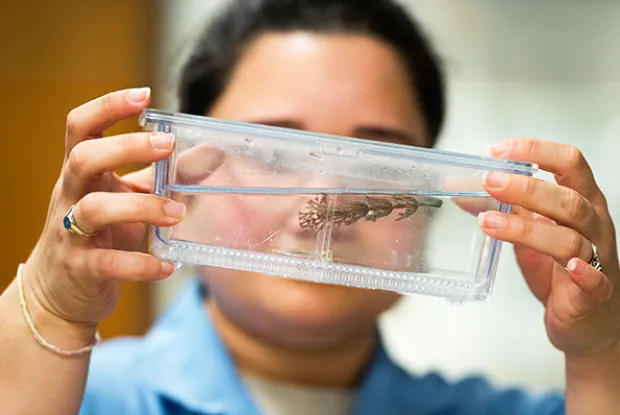
Contact Department of Biology
Burton Hall 115
Smith College
Northampton, MA 01063
Phone: 413-585-6598 Email: bioasst@smith.edu
Facebook Twitter InstagramAdministrative Assistant: Elizabeth Iola Sylvan
Current Chair: David Smith
biochair@smith.edu






